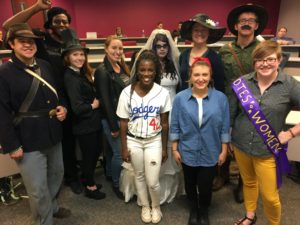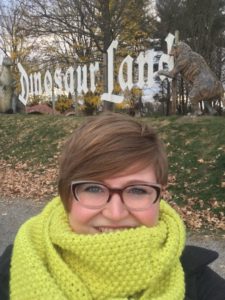How I Learned to Stop Worrying and Love the Process
In August 2016, I found myself in a bit of a bind when the grant funding my work ended unexpectedly. I scrambled and picked up an extra class teaching Introduction to Cross-Cultural Experiences for MTSU’s Global Studies program. I had two books, neither of which was a traditional text book, a few vague syllabi, and an even more vague course description. Most of the instructors in that program are cultural geographers, but Doug Heffington, the program chair, encouraged me to play to my own strengths and interests.

With no restrictions and only 18 students, I set out to create a class where we explored how cultures create identity for themselves and others in thoughtful, informed discussions. I had the beginnings of a syllabus that rewarded participation, encouraged reading and reflection, and eschewed tests and quizzes for journal entries and a final project. I had two weeks’ worth of content set out and no backup plan if it didn’t work. Go big or go home, right?
Public history is, and probably should be, uncomfortable and a little terrifying. Community work involves variables that are beyond our control that can make or break a project. For me, this uncertainty is exhilarating. Some people jump out of planes; I ask for community feedback. I think some of this is because my first community meeting felt like a train wreck. A former elected official laid into me about preservation and questioned my motives for the project. I remember feeling unprepared and convinced that I had irreparably damaged a years-long project. A community member I knew well jokingly offered to escort me to my car. But, while I stood there, numb with failure, Henry Allen approached me about starting an oral history project. People came to the next community meeting, and the project continued. The experience taught me to embrace the process and its messiness, rather than obsessing over the product.
I drew on that experience when I planned my Global Studies class. I dug up articles on engaged learning and sharing authority in the classroom. I talked to colleagues and read up on creating safe spaces for dialogue. The major takeaway from my research was that I needed to give the students a real stake so they would feel responsible for the success of the class. It was scary for this control freak, but ultimately, it was the best class I have ever taught. We had thoughtful discussions on complicated, challenging topics. We bonded as a class, and some of my students became friends with each other.

It was tough semester on a lot of levels. Our schedule got out of whack when I got the stomach flu not once but twice. The 2016 election threw us all for a loop. As I had the rest of the semester, I opted for transparency and sharing authority. I was honest with them about my own feelings, and told them that if they didn’t want to be here today, that was okay, they could leave. I took a blind survey on whether they wanted to have class as usual, or talk about it. They voted to talk about it, so we did. We had an honest, respectful, and open dialogue about what it meant and their fears. No one tried to convince anyone of anything. There was no gloating and no accusation. We listened to each other, something that’s too often missing in our democracy.
This was not a class at a small liberal arts college. Of the 18, only five were women. Most of the men were white STEM majors. In my next post, I’ll do some self-reflection: break down a few elements of the class, looking at what worked and what didn’t, and consider how I can incorporate successful elements of my Global Studies class into current and future teaching.
To be continued.